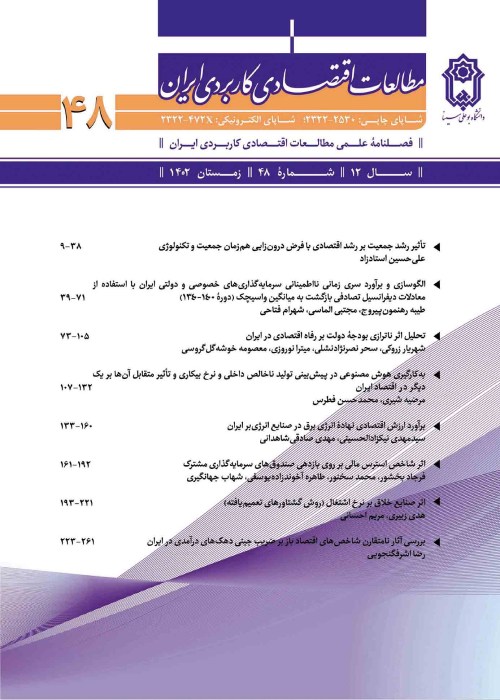Analysis of the role of importing partners in the vulnerability of Iran's inflation: Evidence from global vector error-correcting model (GVECM)
Author(s):
Article Type:
Research/Original Article (دارای رتبه معتبر)
Abstract:
Goal: Increasing interactions of real and financial sectors is regarded as one of the inevitable characteristics for the world economy. These international interdependences can lead to higher degree of inflationary vulnerability to global and foreign shocks. Therefore, the national inflation management is one of the most important challenges that different countries are facing in the global economy. In addition, Iran is a net-food-importing and net-oil-exporting country, and food and energy have considerable share in consumer basket. Hence, Irans economy has a higher degree of inflationary vulnerability. Irans Inflation not only is directly affected by the oil and food shocks, but also is influenced by changes in the inflations of Irans importing partners (spillover effect). In this regard, the present study examines the role of oil and food shocks and foreign inflation on Irans inflation. However, the paper is focused on both direct and indirect (spillover) effects of the oil and food shocks. For instance, the shock in oil price may lead to some changes in global food price and accordingly some changes in inflation in Iran trading partners. Therefore, Irans inflation is also affected by increasing oil price and the inflation changes in trading partners. Similarly, a food price shock can lead to higher inflation of Iran trading partners. Therefore, not only Irans inflation is directly affected by food price shock but also it may be affected by the changes in the inflation of trading partners.
Methodology
The present study aims to evaluate the spillover effect of global shocks on Irans inflation. In this regard, the long-run relationship and short-run dynamics of inflation for 34 countries were analyzed based on a global vector error correction model (GVECM). This model is estimated for 34 countries during 1988Q4-2013Q1. The selected countries have more than 80 percent of world GDP during 1988-2013. On average, 80 percent of the imports in each country were provided by the 33 other countries. In addition, more than 80 percent of Irans imports were done through the countries involved in the GVAR model. Then the regional and global transmission channels of inflationary shocks among the countries are properly included in the GVAR model. The data included inflation rate, exchange rate and gross domestic production for each country, global food and oil prices, and import shares of each country with respect to the other countries. The ability for capturing the interactions and interdependencies in the context of the global economy is one of the most advantages of GVAR models. In this regard, the macroeconomic of each country is modeled as a part of global multi-country model. Hence, the GVAR model captures the spillover effects of cross-countries shocks well.Results
The findings are as follows: 1) the spillover effects of oil shocks on Irans inflation are often in the opposite direction of the direct effect, so that the initial change of inflation is neutralized by Irans importing partners. Food shocks have a direct and significant effect on Irans inflation, which the spillover effects amplify it. 2) Inflation in China and Latin American is sharply influenced by the oil and food shocks. The spillover effects of these countries are transmitted to Irans economy, and hence accentuate the effect of the original shocks. 3) But developed countries (Europe, Japan and South Korea) is able to curb inflationary pressures, and so do not impose inflationary pressures to their trading partners. 4) Variety of Irans importing partners has declined in favor of focusing on developing and more vulnerable countries in particular from the 2000s.Conclusion
Therefore, the dispersion of Irans international trade among developed and emerging countries improves the economy resilience against future inflationary pressures. Language:
Persian
Published:
Quarterly Journal of Applied Economics Studiesin Iran, Volume:7 Issue: 25, 2018
Pages:
131 to 154
magiran.com/p1819971
دانلود و مطالعه متن این مقاله با یکی از روشهای زیر امکان پذیر است:
اشتراک شخصی
با عضویت و پرداخت آنلاین حق اشتراک یکساله به مبلغ 1,390,000ريال میتوانید 70 عنوان مطلب دانلود کنید!
اشتراک سازمانی
به کتابخانه دانشگاه یا محل کار خود پیشنهاد کنید تا اشتراک سازمانی این پایگاه را برای دسترسی نامحدود همه کاربران به متن مطالب تهیه نمایند!
توجه!
- حق عضویت دریافتی صرف حمایت از نشریات عضو و نگهداری، تکمیل و توسعه مگیران میشود.
- پرداخت حق اشتراک و دانلود مقالات اجازه بازنشر آن در سایر رسانههای چاپی و دیجیتال را به کاربر نمیدهد.
In order to view content subscription is required
Personal subscription
Subscribe magiran.com for 70 € euros via PayPal and download 70 articles during a year.
Organization subscription
Please contact us to subscribe your university or library for unlimited access!


